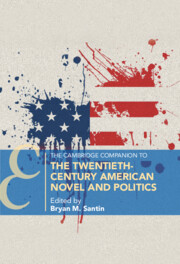Book contents
- The Cambridge Companion to the Twentieth-Century American Novel and Politics
- The Cambridge Companion to the Twentieth-Century American Novel and Politics
- Copyright page
- Dedication
- Contents
- Chronology
- Introduction
- Part I Ideologies and Movements
- Part II The Politics of Genre and Form
- Part III Case Studies
- Chapter 15 Herland (1915): Charlotte Perkins Gilman
- Chapter 16 It Can’t Happen Here (1935): Sinclair Lewis
- Chapter 17 All the King’s Men (1946): Robert Penn Warren
- Chapter 18 Invisible Man (1952): Ralph Ellison
- Chapter 19 The Left Hand of Darkness (1969): Ursula K. Le Guin
- Chapter 20 If Beale Street Could Talk (1974): James Baldwin
- Chapter 21 The Monkey Wrench Gang (1975): Edward Abbey
- Chapter 22 Ceremony (1977): Leslie Marmon Silko
- Chapter 23 Parable Series (1993, 1998): Octavia E. Butler
- Chapter 24 The Underground Railroad (2016): Colson Whitehead
- Further Reading
- Index
- Cambridge Companions To …
Chapter 17 - All the King’s Men (1946): Robert Penn Warren
from Part III - Case Studies
Published online by Cambridge University Press: 07 October 2023
- The Cambridge Companion to the Twentieth-Century American Novel and Politics
- The Cambridge Companion to the Twentieth-Century American Novel and Politics
- Copyright page
- Dedication
- Contents
- Chronology
- Introduction
- Part I Ideologies and Movements
- Part II The Politics of Genre and Form
- Part III Case Studies
- Chapter 15 Herland (1915): Charlotte Perkins Gilman
- Chapter 16 It Can’t Happen Here (1935): Sinclair Lewis
- Chapter 17 All the King’s Men (1946): Robert Penn Warren
- Chapter 18 Invisible Man (1952): Ralph Ellison
- Chapter 19 The Left Hand of Darkness (1969): Ursula K. Le Guin
- Chapter 20 If Beale Street Could Talk (1974): James Baldwin
- Chapter 21 The Monkey Wrench Gang (1975): Edward Abbey
- Chapter 22 Ceremony (1977): Leslie Marmon Silko
- Chapter 23 Parable Series (1993, 1998): Octavia E. Butler
- Chapter 24 The Underground Railroad (2016): Colson Whitehead
- Further Reading
- Index
- Cambridge Companions To …
Summary
All the King’s Men is one of the most significant political novels in US literature. Based on the career of Louisiana governor and senator Huey Long, the novel follows the rise and fall of the fictional Willie Stark. This chapter traces Stark’s development as a populist, using the work of Michael Kazin and others to argue that populism must be defined by its rhetorical characteristics. We know that a political actor is populist not necessarily by their policy proposals, but always by the way they talk. Populism is performed in a language of grievance. The populist uses an emotive rhetoric that invokes a binary of “the people” against an “elite” above them and a racialized poor below them. The populist politician positions himself as “the people’s” representative, the only one who can speak and act on their behalf. This chapter analyzes speeches in All the King’s Men, demonstrating how they embody the populist binary and its rhetorical moves. Ultimately, the chapter considers the economic and social conditions that can allow a demagogue to rise in fiction and in real life.
- Type
- Chapter
- Information
- Publisher: Cambridge University PressPrint publication year: 2023



